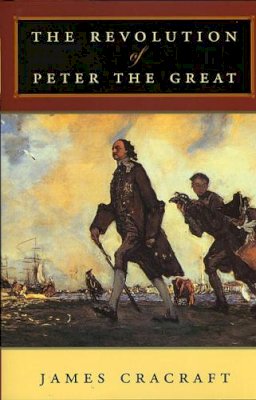
The Revolution of Peter the Great
James Cracraft
Many books chronicle the remarkable life of Russian tsar Peter the Great, but none analyze how his famous reforms actually took root and spread in Russia. In The Revolution of Peter the Great, James Cracraft offers a brilliant new interpretation of this pivotal era.
Linking together and transcending Peter's many reforms of state and society, Cracraft argues, was nothing less than a cultural revolution. New ways of dress, elite social behavior, navigation, architecture, and image-making emerged along with expansive vocabularies for labeling new objects and activities. Russians learned how to build and sail warships; train, supply, and command a modern army; operate a new-style bureaucracy; conduct diplomacy on a par with the other European states; apply modern science; and conceptualize the new governing system. Throughout, Peter remains the central figure, and Cracraft discusses the shaping events of the tsar's youth, his inner circle, the resistance his reforms engendered, and the founding of the city that would embody his vision--St. Petersburg, which celebrated its tercentenary in 2003.
By century's end, Russia was poised to play a critical role in the Napoleonic wars and boasted an elite culture about to burst into its golden age. In this eloquent book, Cracraft illuminates an astonishing transformation that had enormous consequences for both Russia and Europe, indeed the world.
Product Details
About James Cracraft
Reviews for The Revolution of Peter the Great
Cathy A. Frierson, University of New Hampshire Essential reading for those seeking the origin of Russia's ongoing friction between Westernizers and nationalists.
Gilbert Taylor
Booklist
This impressive little book [is] at once informative and intellectually interesting.
E. A. Cole
Choice
This book represents a distillation of James Cracraft's magisterial work The Petrine Revolution, the three volumes of which cover Russian architecture, imagery and verbal culture. It is firmly rooted in a lifetime of research and a formidable body of sources, but targets the general reader in the form of an accessible, lightly-footnoted interpretative history of the reforms of Russia's most important ruler, who reigned from 1682 to 1725.
Lindsey Hughes
Times Literary Supplement
Anglo-American historians have spent a great deal of effort on Peter and his reign in the last decades, the pioneer among them Cracraft himself. He has used his own work and that of his colleagues with thoroughness and tact to provide his own synthesis of the events and their meaning... Cracraft has succeeded in conveying the latest understanding of Peter's time, one that he himself has been so central in creating, in an elegant and highly readable form.
Paul Bushkovitch
Cahiers du Monde Russe
